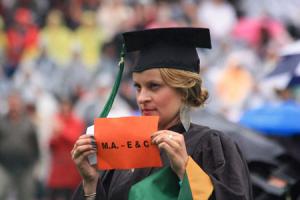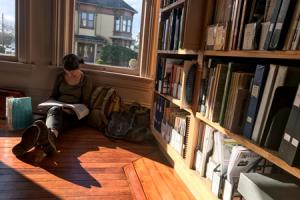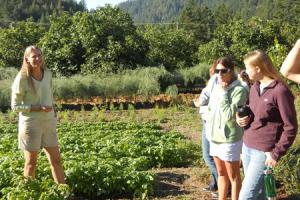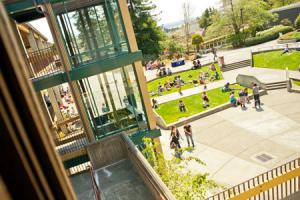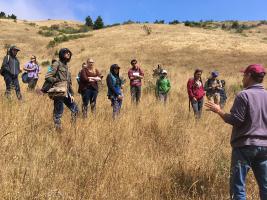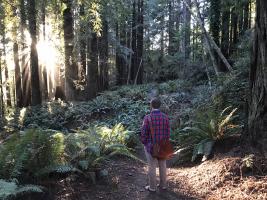Fall 2011
September 22-23
“Traditional Ecological Knowledge Symposium”
Speakers include Dr. Henry P. Huntington, Dr. Frank Lake, Dennis Martinez, Dr. Beth Rose Middleton, Seafha Blount, Dr. Samantha Hatfield, Chris West, Tiana Williams, Dawn McCovey, Mark Higley, Josh Strange, and Lonyx Landry. 9am-12pm in the Black Box Theatre and 1pm-4pm in the Native American Forum
September 29
Jeff Mapes
“How the Bicycle is Changing American Cities”
Watch full presentation
Jeff Mapes spent more than three years researching and writing Pedaling Revolution: How Cyclists are Changing American Cities. A longtime bike commuter, Mapes decided to write his book after watching the growth of a robust urban bike culture in Portland. He visited cities around the country and in Europe and charted the growth of cyclists’ political power. Pedaling Revolution was reviewed by The New York Times and numerous other publications and is now in its third printing. Mapes is also the senior political reporter for The Oregonian, the daily newspaper in Portland. He has covered numerous state, congressional and presidential campaigns as well as several sessions of the Oregon Legislature, and he is a former Washington correspondent. He is the author of a political blog, Mapes on Politics, and is a regular contributor to Oregon Public Broadcasting. Mapes continues to write and lecture about cycling and its importance as a means of transportation. He lives in Portland with his wife Karen. Their last transportation purchase was a cargo bike.
Evan Mills
October 6
“The Carbon Footprint of Indoor Cannabis Production”
Watch full presentation
Dr. Evan Mills is a scientist at the Lawrence Berkeley National Lab, which is managed by the University of California for the U.S. Department of Energy. He has worked as an energy analyst since the early 1980s, specializing in ways to reduce greenhouse gas emissions via improved energy end-use efficiency in buildings. He received a Masters of Science degree from the Energy and Resources Group (where he is now a Research Affiliate) at U.C. Berkeley in 1987 and a Ph.D. from the Department of Environmental and Energy Systems Studies at the University of Lund in Sweden in 1991. He has over 200 publications in his field. He is a member of the international body of scientists which has worked over the past two decades under the Intergovernmental Panel on Climate Change (IPCC), which collectively shared in the Nobel Peace Prize for 2007 with former U.S. Vice President Al Gore “for their efforts to build up and disseminate greater knowledge about man-made climate change, and to lay the foundations for the measures that are needed to counteract such change.”
Arne Jacobson
October 13
“Super Efficient Appliances, International Cooperation, and the Climate Challenge”
Watch full presentation
Arne Jacobson is an Associate Professor in the Environmental Resources Engineering department and a Co-Director of the Schatz Energy Research Center at Cal Poly Humboldt. He served as a Senior Advisor in the Office of Policy and International Affairs at the U.S. Department of Energy in Washington, DC for a year during 2010-11 while on leave from Humboldt. During that time Arne played leading roles in two international initiatives associated with the Clean Energy Ministerial. These were the Super-efficient Equipment and Appliance Deployment (SEAD) initiative and the Solar and LED Energy Access (SLED) initiative. His talk on October 13 will focus on work associated with the SEAD initiative.
Amol Phadke
October 20
“Low Carbon Strategies for the Indian Electricity Sector: Opportunities for Leapfrogging”
Watch full presentation
Dr. Amol Phadke is a Principal Scientific Engineering Associate at the International Energy Studies Group, Energy Analysis Department at the Lawrence Berkeley National Laboratory (LBNL). His research focuses on low carbon pathways for the electricity sector and policy and program innovation to achieve the same. He currently leads LBNL’s support to the U.S. Department of Energy on the Super Efficient Appliance Deployment Initiative (SEAD), a multi country collaboration to accelerate appliance and equipment efficiency. He also co-leads LBNL’s collaboration with the Regulatory Assistance Project as a Global Best Practice Network on Power where most of LBNL’s efforts are focused on clean energy policies and programs in India. Amol routinely advises national and state governments in India and the U.S. on clean energy policies and programs. Amol has a Bachelor of Engineering degree from Government College of Engineering, Pune, India and a M.S. and Ph.D. from the Energy and Resources Group, UC Berkeley.
Geeta Chowdry
October 27
To Bt or not to Bt? Transnational Capital, the State, Civil Society and the Struggle over Food Sovereignty in India
Watch full presentation
Geeta Chowdhry is Professor and Chair of Politics and International Affairs at Northern Arizona University. She is currently working on Food Justice Movements in India and a co-edited book on Postcolonial Feminism and International Relations. She has co-edited Power, Postcolonialism and International Relations: Reading Race, Gender and Class. Her recent publications include “Race(ing) Feminist International Relations (IR): A Critical Overview of Postcolonial Feminism in IR (2010) (co-authored); “Imagining the Other: Orientalist Representations of India in Social Science Textbooks” (2010) (co-authored); “Edward Said and Contrapuntal Reading: Implications for Critical Interventions in International Relations (2008).
Her research and teaching interests focus on international relations theory, feminist theory, postcolonialism, intersectionality particularly race and ethnicity, international political economy, globalization, development and sustainability, and South Asia.
Noah Zerbe
November 3
“Reshaping Globalization from the Ground Up: Community Resilience and Transformation in Durban, South Africa”
Watch full presentation
Noah Zerbe is Associate Professor of Politics and affiliated with the Master of Arts in Social Science: Environment and Community Program, and the Master of Science: Energy, Environment, and Society Program at Cal Poly Humboldt (Humboldt). Prior to arriving at Humboldt in 2004, Noah spent two years as a post doctoral fellow at the Centre de Philosophie du Droit at the Université catholique de Louvain in Belgium. He has also spent extensive time in Canada, Zimbabwe, and Russia.
Noah’s research and teaching interests consider the social, political and economic context of technological development and innovation. Empirically, he focuses on issues surrounding the adoption of agricultural biotechnology in Southern Africa. This includes both the technology itself as well as the international, regional and local context of adoption. His empirical research informs more theoretical questions regarding privatization and enclosure, the nature of value, theories of property, property rights and ownership, social conceptions of risk, the role of the state, the nature of regulation and public policy, and the role of social movements and local resistance. Noah’s more recent work, including a summer Fulbright grant to Germany, has focused on differing systems of regulation in the United States and Europe. He is the author of the Global Food Politics blog.
John Elliot
November 10
“UC Merced: Achieving Zero Net Energy and Zero Landfill Waste by 2020”
Watch full presentation
John Elliott is Director, Energy and Sustainability at UC Merced. As co-chair of the Chancellor‘s Advisory Committee on Sustainability, he is also responsible for shaping and implementing the campus sustainability strategy, which includes a “Triple-Zero” commitment to zero net energy, zero landfill waste, and climate neutrality by 2020. John is involved in new construction, operations, and planning, as well as engaged in faculty teaching and research to create a sustainability “living laboratory.”

